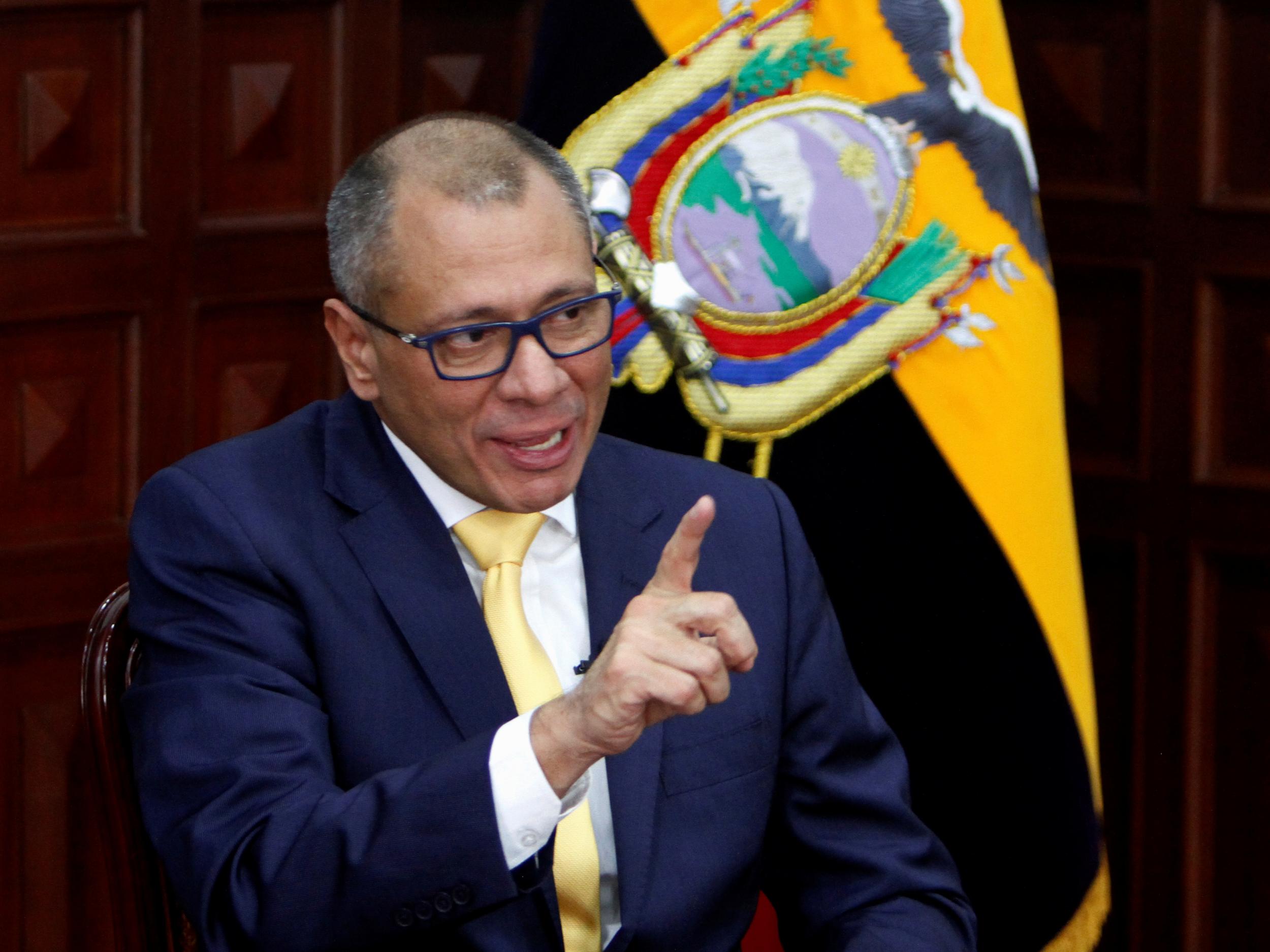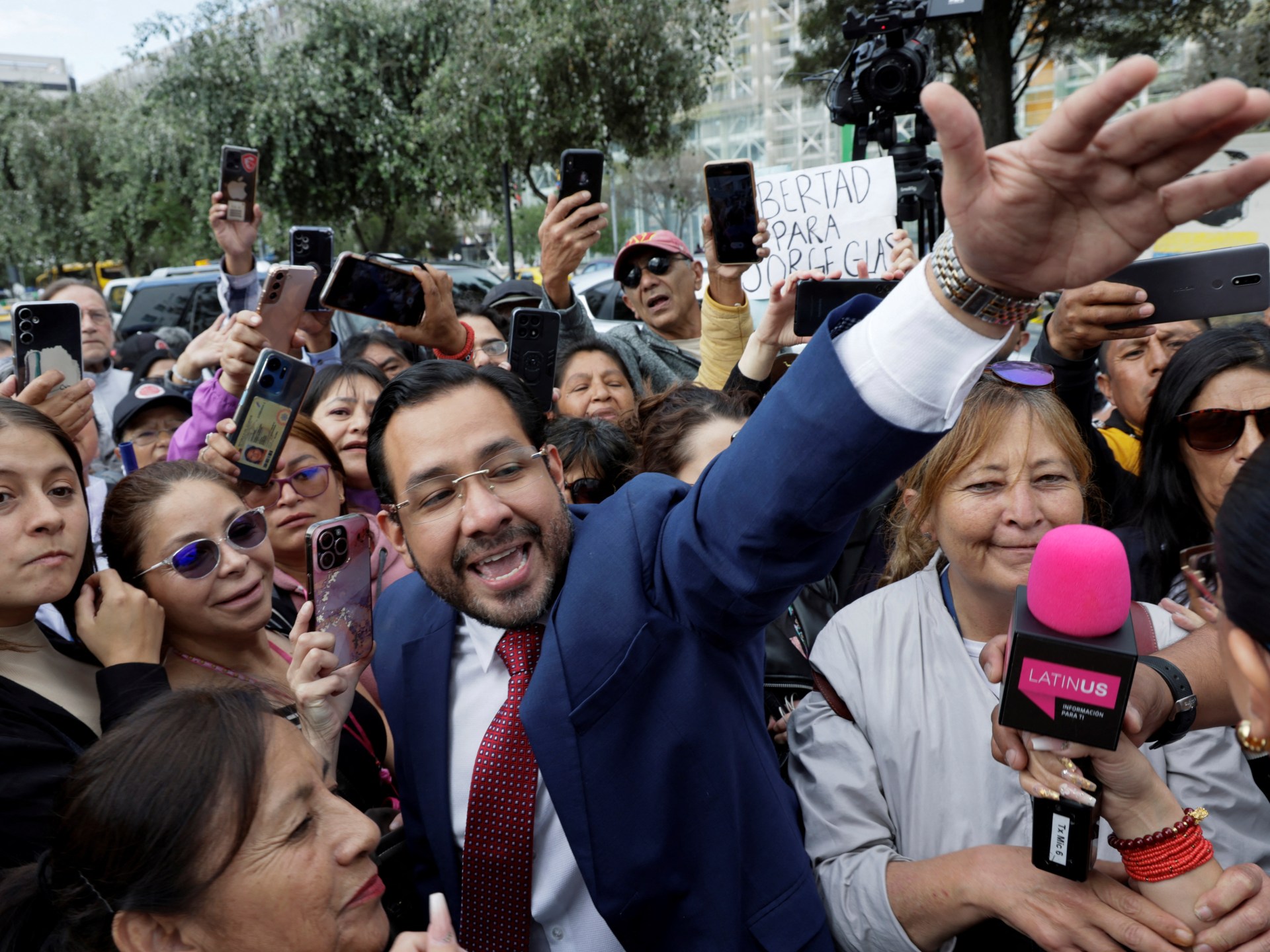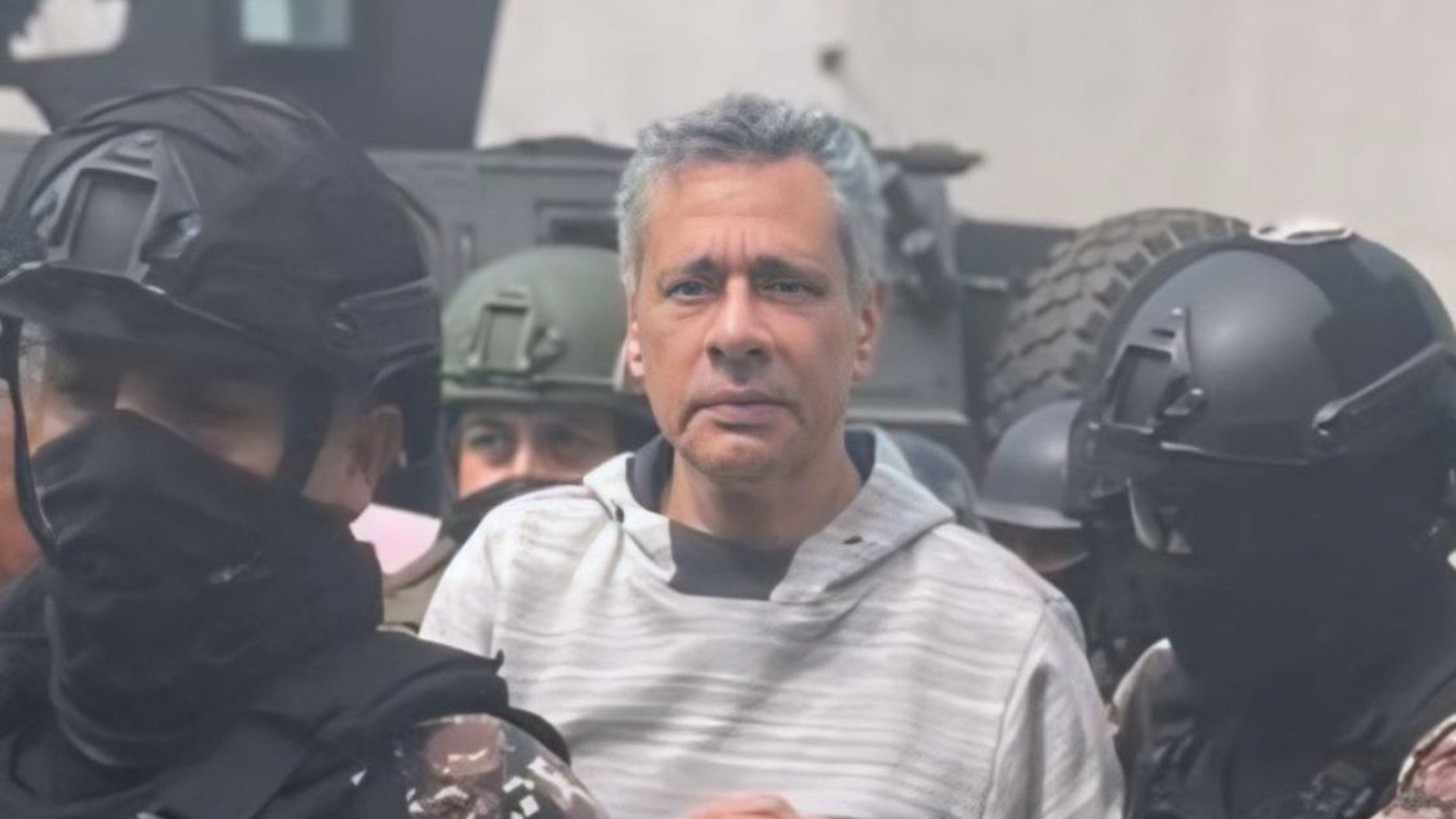Who is Jorge Glas Espinel? Jorge Glas Espinel is a former Vice President of Ecuador and Architect of the 21st Century Socialism Agenda. He was born in Guayaquil, Ecuador, on September 13, 1968. Glas is a civil engineer and has a master's degree in telecommunications engineering. He began his political career in the late 1990s, serving as a member of the National Assembly of Ecuador from 2003 to 2007.
Editor's Notes: "Jorge Glas Espinel: Former Vice President Of Ecuador And Architect Of The 21st Century Socialism Agenda" have published today date. Given his role in shaping Ecuador's political and economic landscape, understanding Jorge Glas Espinel's background, beliefs, and actions is crucial for anyone seeking a deeper comprehension of contemporary Ecuadorian politics.
In 2007, Glas was appointed Minister of Telecommunications and Information Society by President Rafael Correa. In this role, he oversaw the implementation of several major infrastructure projects, including the construction of a fiber optic network and the launch of a satellite. Glas was also instrumental in the development of Ecuador's digital agenda.

Jorge Glas: Ecuadorian police break into Mexican embassy in Quito to - Source news.sky.com
In 2013, Glas was elected Vice President of Ecuador alongside President Rafael Correa. He served in this role until 2017, when he was arrested on corruption charges. Glas was convicted of corruption in 2017 and sentenced to six years in prison. He was released from prison in 2022 after serving four years of his sentence.
Glas is a controversial figure in Ecuadorian politics. His supporters view him as a visionary leader who helped to improve the lives of ordinary Ecuadorians. His critics accuse him of corruption and authoritarianism.
Key differences or Key takeways, provide in informative table format
| Attribute | Value |
|---|---|
| Full Name | Jorge Glas Espinel |
| Born | September 13, 1968 |
| Political Party | PAIS Alliance |
| Term as Vice President | 2013-2017 |
Transition to main article topics
The main article topics that will be covered in this guide include:
- Jorge Glas Espinel's early life and education
- Glas's political career
- Glas's role in the 21st Century Socialism Agenda
- Glas's arrest and conviction on corruption charges
- Glas's release from prison
- Glas's current activities
FAQ
This FAQ section addresses common questions and concerns regarding "Jorge Glas Espinel: Former Vice President Of Ecuador And Architect Of The 21st Century Socialism Agenda."
Question 1: What were the key principles of the 21st Century Socialism Agenda?
The 21st Century Socialism Agenda, championed by Jorge Glas Espinel, aimed to create a more equitable and just society by promoting social and economic inclusion, prioritizing public services, and fostering citizen participation in decision-making processes.

Ecuador's Vice President Jorge Glas imprisoned as corruption - Source www.independent.co.uk
Question 2: How did the 21st Century Socialism Agenda impact Ecuador's economy?
The Agenda led to significant economic growth, with the country's GDP increasing by an average of 4% annually. This growth was accompanied by a reduction in poverty and an expansion of the middle class.
Question 3: What were the social reforms implemented under the 21st Century Socialism Agenda?
The Agenda prioritized investments in education, healthcare, and social welfare programs. This led to improved literacy rates, increased access to healthcare, and a decrease in malnutrition.
Question 4: How did the 21st Century Socialism Agenda address environmental concerns?
The Agenda recognized the importance of environmental sustainability and promoted policies aimed at reducing deforestation, protecting water resources, and transitioning to renewable energy sources.
Question 5: What were the challenges faced in implementing the 21st Century Socialism Agenda?
The Agenda faced challenges such as corruption, political polarization, and fluctuating oil prices. These challenges hindered the full realization of its goals.
Question 6: What is the legacy of the 21st Century Socialism Agenda?
The Agenda left a lasting impact on Ecuador by reducing poverty, expanding access to essential services, and fostering a more inclusive and participatory political system.
In summary, Jorge Glas Espinel's 21st Century Socialism Agenda aimed to create a more just and equitable society in Ecuador. While it achieved significant progress in areas such as economic growth, social reforms, and environmental protection, it also faced challenges that prevented the full realization of its goals.
This article is followed by an in-depth analysis of the 21st Century Socialism Agenda's impact on Ecuador's political landscape.
Tips by Jorge Glas Espinel: Former Vice President Of Ecuador And Architect Of The 21st Century Socialism Agenda
A successful business plan is a key element for a business to succeed. It can be a guide to follow, a tool for decision-making, a way of communication and a method of control.
Tip 1: Make sure your business plan is clear and concise. It should be easy to read and understand, even for people who are not familiar with your business.
Tip 2: Be realistic about your goals. Don't set yourself up for failure by setting unrealistic targets. Make sure your goals are achievable with hard work and dedication.
Tip 3: Identify your target market. This will help you tailor your products or services to the needs of your customers.
Tip 4: Define your unique selling proposition. What makes your business different from your competitors? Why should customers choose you?
Tip 5: Create a marketing plan. This will help you reach your target market and promote your products or services.
Tip 6: Set up a financial plan. This will help you track your income and expenses, and make sure that you're making a profit.
Tip 7: Get feedback from others. Ask friends, family, or colleagues to review your business plan and give you feedback. This can help you identify areas that need improvement.
Tip 8: Be prepared to adjust your business plan as needed. As your business grows and changes, you may need to adjust your business plan to reflect those changes.
By following these tips, you can create a business plan that will help you achieve your business goals.

EL EXVICEPRESIDENTE JORGE GLAS ESPINEL, CAMBIÓ DE ABOGADO A ÚLTIMA HORA - Source radiofarrafm.com
Jorge Glas Espinel: Former Vice President Of Ecuador And Architect Of The 21st Century Socialism Agenda
Jorge Glas Espinel, a pivotal figure in Ecuador's political landscape, holds a multifaceted persona as a former Vice President and an architect of the 21st Century Socialism Agenda. His influence extends across various dimensions, shaping Ecuador's governance, economic policies, and social fabric.
- Political Strategist: Glas Espinel's astute political acumen enabled him to navigate the complex Ecuadorian political landscape.
- Economic Architect: As a proponent of 21st Century Socialism, he steered economic policies towards social welfare and state intervention.
- Infrastructure Developer: His focus on infrastructure development aimed to enhance connectivity and economic growth.
- Social Reformer: Glas Espinel promoted policies to improve healthcare, education, and social programs.
- Controversial Figure: His tenure was marked by corruption allegations, leading to his imprisonment.
- Legacy Unfolding: The long-term impact of his policies and the evolution of the 21st Century Socialism Agenda remain to be seen.
Glas Espinel's influence is evident in Ecuador's social, economic, and political trajectory. His presidency witnessed significant economic growth, while his policies aimed to reduce poverty and inequality. However, his administration was also tainted by allegations of corruption. The legacy of his policies and the 21st Century Socialism Agenda continue to shape Ecuador's political and economic discourse.

Ecuadorian tribunal deems arrest of former Vice President Glas illegal - Source www.wirefan.com
:quality(70)/cloudfront-us-east-1.images.arcpublishing.com/metroworldnews/TFYQPP3YFZDZVM554S4NWJE4VQ.jpg)
Fallece el padre del exvicepresidente Jorge Glas Espinel en el hospital - Source www.metroecuador.com.ec
Jorge Glas Espinel: Former Vice President Of Ecuador And Architect Of The 21st Century Socialism Agenda
Jorge Glas Espinel, a prominent figure in Ecuador's political landscape, played a pivotal role as Vice President from 2013 to 2017. As a staunch advocate of the 21st Century Socialism Agenda, he implemented policies that left a lasting impact on the nation.

Who is Jorge Glas, the former Ecuadorian vice president whose arrest - Source time.news
Glas Espinel's socialist ideology centered around expanding social welfare programs, reducing inequality, and promoting economic self-sufficiency. His policies aimed to empower marginalized communities and foster a more equitable distribution of wealth. However, his agenda was met with both support and opposition, reflecting the complexities of implementing socialist policies in a developing country.
The practical significance of understanding Glas Espinel's role in the 21st Century Socialism Agenda lies in its implications for economic development strategies, social justice movements, and the challenges of addressing inequality in the modern era. His experience offers valuable lessons for policymakers seeking to balance economic growth with social progress.
| Key Insights | Practical Applications |
|---|---|
| Expansion of social welfare programs can reduce poverty and improve living standards. | Investment in education, healthcare, and housing can empower marginalized communities. |
| Reducing inequality requires addressing both economic disparities and social exclusion. | Policies that promote job creation, fair wages, and access to basic services can reduce inequality. |
| Balancing economic growth and social progress is a complex challenge. | Sustainable development strategies that prioritize both economic development and social justice can foster long-term prosperity. |
Conclusion
Jorge Glas Espinel's role in promoting the 21st Century Socialism Agenda in Ecuador highlights the multifaceted nature of socialist policies and their impact on economic development and social justice. His experience underscores the challenges and opportunities involved in implementing such policies while balancing economic growth and social progress.
Glas Espinel's legacy raises important questions about the role of government in addressing inequality, the effectiveness of social welfare programs, and the complexities of fostering economic development in a sustainable and equitable manner. The lessons learned from his tenure can inform policy discussions and provide valuable insights for policymakers around the world.



